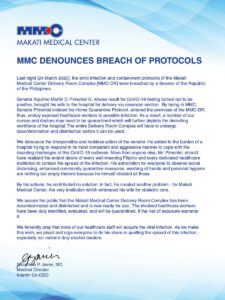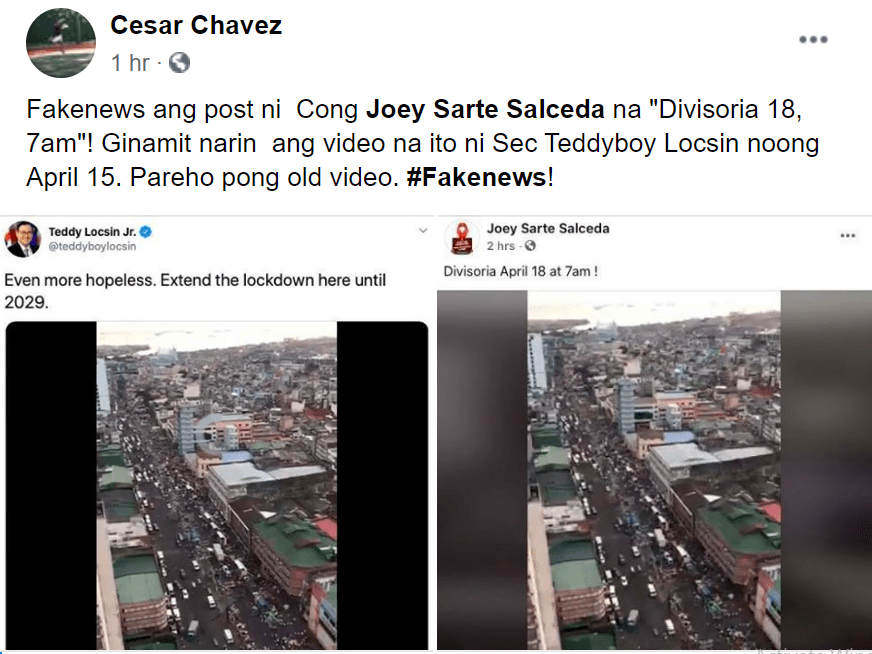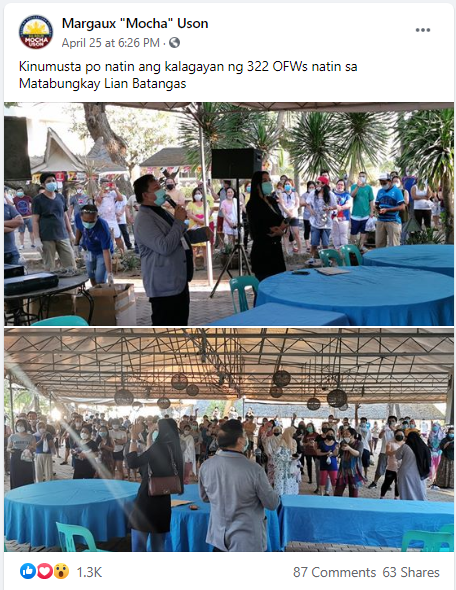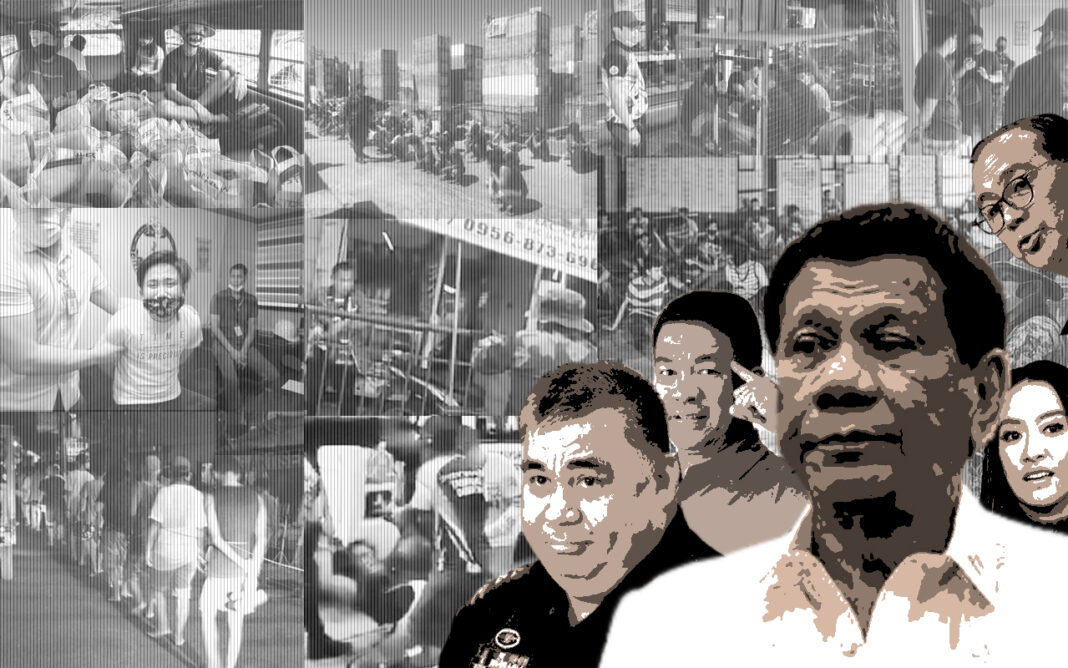As the COVID-19 pandemic brought about sweeping changes that spared no one, a lockdown was implemented in Metro Manila and then the whole of Luzon at a time when mass testing was not done and no effective contact tracing and isolation of cases as it remains to this day. The lockdown is now seen to have brought the frontlines of this ‘war’ not at curbing the spread of the virus, but against the people.
Republic Act (RA) 11469, otherwise known as the Bayanihan to Heal as One Act, was enacted March 2020 to help every Filipino affected by the crisis. Its implementation could not have been more uneven. The law for additional powers for the president implemented spcial amelioration program allocates an emergency subsidy of up to P8,000 per month for low income households, and also allows local government units to use more than 5% of their calamity fund to further ease the burden of the people. While some have received the delayed government aid, many Filipinos are still left waiting for help that may not come and become one of the reasons prompting countless citizens to leave the safety of their homes for their survival.
The lockdown came with strict stay at home guidelines, also considered a 24-hour curfew. These guidelines are what has been used to effect arrests. There is, however, no criminal liability for mass gatherings or no social distancing in the Bayanihan Act or Republic Act (RA) 11332 or the Mandatory Reporting of Notifiable Diseases and Health Events of Public Health Concern Act. Hence, no arrests should have been effected with these as basis without a warrant after proper procedure. Local government ordinances, however, ruled on fines and arrests for quarantine violators—sometimes for simply being at the wrong place at wrong time, like being outside your front door, not wearing a face mask or riding-in-tandem on a motorcycle when the authorities are around.
Tight community quarantine regulations have made going out for groceries, food, or livelihood a constant dance with the possibility of being beaten up, harassed, or shot by the police.
Last April 21st, former soldier Winston Ragos was shot and killed by the police at a quarantine checkpoint. It was reportedly set off with Ragos, who was later found to have mental health problems and lacking his medicines provided by the military during the lockdown, walked pass the police and taunted them. On May 18, we learned that the criminal charges filed against Police Master Sgt. Daniel Florendo Jr. was sent back to the prosecutor for lack of evidence.
From March 17 to April 24, the Philippine National Police (PNP), who was assigned to implement the lockdown, reported that 35,270 individuals have been arrested in Luzon alone among a total of 145,940 apprehended. More than 103,000 were let off with a warning while 6,889 were fined. Scores others were detained or charged, though the PNP has not yet recently disclosed the number of those who remained detained to this day. The PNP chief said then that there will be zero tolerance for violators and they would no longer be warned. We have seen countless of reports how the mass arrests led to no social distancing and possible acts of torture, such as being made to sit under the sun, being asked to do exercises while some have claimed to have been beaten up as the recent case in Cavite.
This swift hand of punishment, however, has not been felt by prominent individuals who are no less violators of quarantine rules, with authorities choosing to err on the side of compassion despite blatant infractions.
 When Sen. Aquilino “Koko” Pimentel went with his pregnant wife who has a scheduled delivery at a Makati hospital and a Taguig supermarket, he had already been in self-isolation. Later that week, his test results came back positive. For recklessly endangering people by exposing them to the virus, the senator is facing up to a year and a half of prison, and fines totaling P100,000. Despite security footage and definitive proof that the senator knowingly broke quarantine, investigation does not begin until May 20. There was no arrest or summon that we know of as been handed to ordinary people who were unlike him, a senator and party mate of the president. He has since, however, apologized.
When Sen. Aquilino “Koko” Pimentel went with his pregnant wife who has a scheduled delivery at a Makati hospital and a Taguig supermarket, he had already been in self-isolation. Later that week, his test results came back positive. For recklessly endangering people by exposing them to the virus, the senator is facing up to a year and a half of prison, and fines totaling P100,000. Despite security footage and definitive proof that the senator knowingly broke quarantine, investigation does not begin until May 20. There was no arrest or summon that we know of as been handed to ordinary people who were unlike him, a senator and party mate of the president. He has since, however, apologized.
 Among the offenses specifically punishable under the Bayanihan Act is the spreading of false information, causing panic and fear. There has been more than 40 arrested for spreading ‘fake news’, while some of these were clearly opinions or satirical comments such as the one posted by writer Maria Victoria Beltran, who has after her arrest received the Deutsche Welle Freedom of Speech Award. Last April, Albay 2nd District Rep. Joey Salceda and Foreign Affairs Secretary Teddy Boy Locsin Jr. shared a video of a crowded Divisoria market, condemning the clear disregard for social distancing. The local government of Manila was quick to confirm that the video circulated was in fact old footage. Locsin later made a retraction, citing the video as ‘fake news’, and imploring the public to ignore the falsehood it purports. With that, Locsin seemed to have dodged considerable fines and possible jail time.
Among the offenses specifically punishable under the Bayanihan Act is the spreading of false information, causing panic and fear. There has been more than 40 arrested for spreading ‘fake news’, while some of these were clearly opinions or satirical comments such as the one posted by writer Maria Victoria Beltran, who has after her arrest received the Deutsche Welle Freedom of Speech Award. Last April, Albay 2nd District Rep. Joey Salceda and Foreign Affairs Secretary Teddy Boy Locsin Jr. shared a video of a crowded Divisoria market, condemning the clear disregard for social distancing. The local government of Manila was quick to confirm that the video circulated was in fact old footage. Locsin later made a retraction, citing the video as ‘fake news’, and imploring the public to ignore the falsehood it purports. With that, Locsin seemed to have dodged considerable fines and possible jail time.
Arrests in the recent weeks included those who posted opinions and criticisms with the government pandemic response, including a high school teacher offering a bounty for the president an amount he does not have—something at this point is within the bounds of free speech. He was arrested from a province three hours away from Manila without a warrant, supposedly for libel. And even when his arrest was found deficient and he regretted his actions (as did Koko and Locsin?), he remained in custody as authorities insisted that he already confessed through the media interviews he gave after owning up to the post. A construction worker who offered double the bounty was arrested. Plus another who questioned the government’s arms deal amid the lockdown. And a salesman who called the president ‘buang’ (crazy) was also arrested.
Meanwhile, the Department of Labor and Employment went as far as requesting the deportation of caregiver Linn Ordidor from Taiwan for her criticisms of the Philippine government’s actions so far which DOLE deemed “malevolent.” Fortunately for Ordidor, Taiwan jettisoned DOLE’s request and stood by her freedom of speech.
 Despite the ban on mass gatherings, Mocha Uson, an Overseas Workers Welfare Administration official, visited more than 300 repatriated overseas Filipino workers undergoing the mandatory 14-day quarantine in Batangas. Those in attendance wore masks, but social distancing was barely, if at all, observed. Despite public outcry, with several calling for Uson’s ouster, action is yet to be done.
Despite the ban on mass gatherings, Mocha Uson, an Overseas Workers Welfare Administration official, visited more than 300 repatriated overseas Filipino workers undergoing the mandatory 14-day quarantine in Batangas. Those in attendance wore masks, but social distancing was barely, if at all, observed. Despite public outcry, with several calling for Uson’s ouster, action is yet to be done.
Perhaps a less heinous breach of protocol, but nonetheless a breach and perceived as an act of using his influence as military top official for his personal gain, Armed Forces of the Philippines Chief of Staff General Felimon Santos Jr. attempted to directly write to Chinese ambassador Huang Xilian. In the letter, which was leaked online, Gen. Santos was seeking to purchase five Carrimycin, a drug that he said had helped him recover from COVID-19. The medicine, Santos said, was to be given to Gen. Santos’ friends. The drug is yet to be approved in the Philippines by the Food and Drug Administration.
Former senator Jinggoy Estrada was arrested for reportedly violating San Juan’s enhanced community quarantine, handing out fish with bare hands to the people in his effort to help out. Estrada, a local of San Juan, was apprehended for distributing relief goods without a permit and not practicing social distancing. He was subsequently released without charges after police opted to exercise maximum tolerance. This came after the arrest of relief volunteers in Marikina and cases filed against the four volunteers and 14 relief beneficiaries who were arrested in Quezon City for violating the rules of the enhanced community quarantine (ECQ), affiliated to known activist groups Gabriela and Kabataan. This came after the arrest and filing of charges against relief volunteers from Anakpawis even when they have secured a permit from a government agency.
 National Capital Region Police Office (NCRPO) chief Major General Debold Sinas’ “extraordinary birthday celebration” on May 8 was revealed through the photos his own agency posted. It was complete with buffet food, beer, songs, cakes, roses and singing amid the ban on mass gatherings. Several government officials came to his defense; with the PNP chief echoing Sinas’ story that there was no party. Sinas offered several reasons to deny the party, before apologizing but then saying he did not see anything wrong with it. After much public outcry, the authorities said on May 15 they will file criminal charges against him and 18 others identified on the photos. But on May 18, the PNP chief said Sinas is hard to replace during this emergency and will stay on as NCR Police office chief.
National Capital Region Police Office (NCRPO) chief Major General Debold Sinas’ “extraordinary birthday celebration” on May 8 was revealed through the photos his own agency posted. It was complete with buffet food, beer, songs, cakes, roses and singing amid the ban on mass gatherings. Several government officials came to his defense; with the PNP chief echoing Sinas’ story that there was no party. Sinas offered several reasons to deny the party, before apologizing but then saying he did not see anything wrong with it. After much public outcry, the authorities said on May 15 they will file criminal charges against him and 18 others identified on the photos. But on May 18, the PNP chief said Sinas is hard to replace during this emergency and will stay on as NCR Police office chief.
But then, this does not stop at this level.
President Rodrigo Duterte flew home to Davao City midnight of May 16, or the first hours that the lockdown was lifted in his hometown, despite Metro Manila where he came from is still under modified ECQ that banned flights and inter-island travel. He was reported to have been feeling homesick. An updated set of guidelines published after Duterte left Manila stated that “government officials and government frontline personnel” are allowed to move “across areas placed under any form of community quarantine.” Davao Mayor Sarah Duterte defended her father for going home or traveling, saying he is a frontliner. He did not address the people on Monday, as was his usual schedule, but also usually delayed.
The inconsistencies in the implementation of the quarantine rules that government has used to apprehend more than 100,000 is very apparent in these few glaring examples of violations committed by people of influence – violations which essentially went unpunished.
Yet it is government that peddles the ‘pasaway’ narrative in its reports on arrested quarantine violators and that oft-repeated reminder, “huwag pasaway.” A messaging that deflects the blame to ordinary people in a time a military solution was applied to a public health crisis. The ‘pasaway’ narrative conveniently blamed quarantine violators or those who go out of their homes without essential business for the rise of COVID-19 cases that then led to the lockdown in Metro Manila being extended three times and would now surpass that of Wuhan.
But more than the 100,000 cases arrested (many which should not have been), there are more than 3 million ‘authorized persons outside residence’ in NCR alone. These are the one per household allowed to go out and buy essential goods because government did not promise to make ends meet, in a region that has 3.1 million families as of the 2015 Census ((12.5 million in Luzon). Would prevalence of cases among health workers (accounting for almost 20% of COVID-19 cases), rise in cases among police (many of them among the deployed 100,000 deployed to implement the lockdown) and those in jails complement the ‘pasaway’ narrative? If it were true that rise in cases were due to those who go out, the idea that COVID-19 has been contracted in groceries and markets that remained open would not have been disproved for lack of evidence. Still, the lack of mass testing is what has not allowed the source of transmission to be identified and broken.
That has been the story so far for the Filipino during lockdown – a story of double-standards, hypocrisy, and irregularity. As the government looks to ease restrictions come May 15 or review them since a surge of people and cars came out since May 16, some cities are heading into it with full confidence, after having prioritized public services like mass testing and relief distribution. In some cities, the number of new cases is beginning to climb. In some cities, authorities like the police have been proactive, handing out masks instead of making arrests. Elsewhere, even a street vendor can receive a brutal beating.
While the COVID-19 pandemic cast big clouds of panic, fear, and uncertainty that blanketed the entire Philippines, it is apparent that some simply have the privilege to sit high enough to not see them. Who, now, is the real pasaway?





























